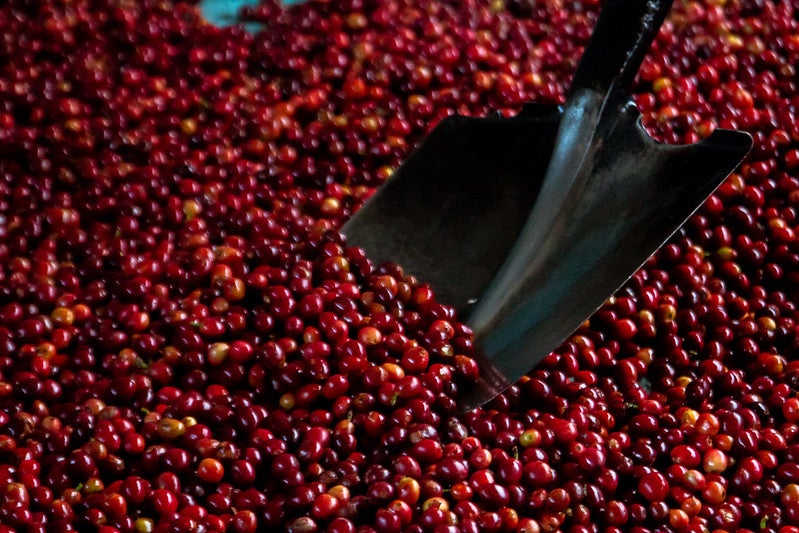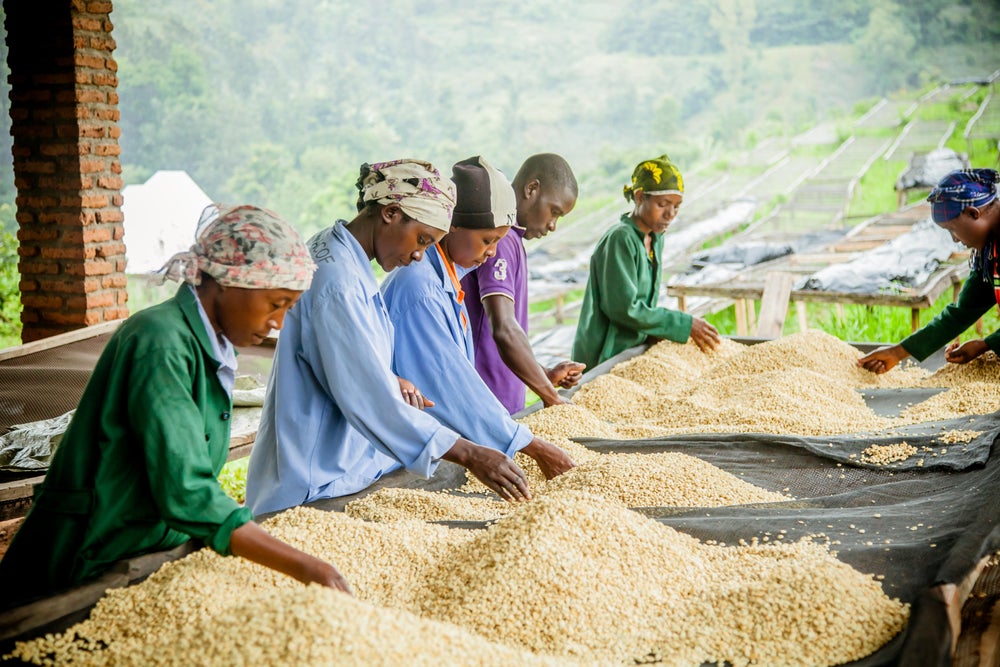

Rwanda
Despite its turbulent history, today Rwanda is one of the specialty coffee world’s darlings – for good reason! Our sister company in Rwanda does an amazing job of bringing the best that Rwanda has to offer to roasters around the world.
Details
- Place In World Production:
- #29
- Average Annual Production:
- 280,000 (in 60kg bags)
- Common Arabica Varieties:
- Red Bourbon, French Mission Bourbon, Caturra, Catuai, Mibirizi
- Key Regions:
- West Province along Lake Kivu | South Province | North Province | East Province
- Harvest Months:
- March - June
Offers
Coffee Arrives in Rwanda
Although Rwanda’s colonial past is central to the introduction of coffee in the country, due to Rwanda’s landlocked position close to the center of Africa, few Europeans actually set foot in the country until well into the mid-1890s. Even after the 1885 “Conference of Berlin” when Germany declared control over the areas of modern Burundi and Rwanda, the first documented European traveler to ever set foot in Rwanda did not arrive until 1894.
German missionaries and settlers brought coffee to Rwanda in the early 1900s. Largescale coffee production was established during the 1930 & 1940s by the Belgian colonial government, who officially controlled the Belgian Congo from 1908 to 1960 and the twin territory of Ruanda-Urundi (that later became the countries of Rwanda and Burundi) from 1922 until independence in 1962.
The Belgian government made coffee growing mandatory during their rule. The Belgians forced native Rwandans to grow coffee in order to produce cheap, plentiful, low-quality coffee for export. Most of the profits from coffee production left Rwanda, along with the coffee itself.
When the Belgian government withdrew, many stopped tending their trees because it was no longer compulsory. For some, coffee was seen as a symbol of colonial oppression. However, many also saw the economic advantages of continuing to grow coffee, and the industry quickly became important to Rwanda’s national economy.
Coffee production continued after the Belgian colonists left. By 1970, coffee had become the single largest export in Rwanda and accounted for 70% of total export revenue. Coffee was considered so valuable that, beginning in 1973, it was illegal to tear coffee trees out of the ground.
Crisis and Recovery
Between 1989 and 1993, the breakdown of the International Coffee Agreement (ICA) caused the global price to plummet. Considering the massive role that coffee played in Rwanda’s income, the government and economy took a hard hit from low global coffee prices. The 1994 genocide and its aftermath led to a complete collapse of coffee exports and vital USD revenue. But the incredible resilience of the Rwandan people is evident is the way that the economy and stability have recovered since then.
Modern Rwanda is considered one of the most stable countries in the region. Since 2003, its economy has grown by 7-8% per year and coffee production has played a key role in this economic growth.
This incredible recovery is due in part to the strong government support for the coffee sector as well as trade rules helping exports and international investment into the coffee sector. About ten years after the end of the civil war, the government instituted the National Coffee Strategy that helped improve and expand the coffee industry. The strategy encourages high-quality production for the specialty coffee market. Funding comes from the Rwandan government, other nations and private investors. Economic outcomes for farmers are now much better than they once were.
Previously, Rwandan coffee farmers processed their cherry at home. They would roughly de-pulp the cherry, wash it, maybe ferment it and probably dry it on the floor. This created a very low-quality commodity coffee called semi-washed. To improve the quality of coffee, the government incentivized the creation of new Central Washing Stations (CWSs) in coffee-producing areas. The first CWS was established in 2001. Today, more than 300 washing stations operate across Rwanda.
The growth of washing stations and the improvement in processing for Rwandan coffees has added at least a 40% premium to Rwandan coffee’s export value.
Coffee Production Today
Today, smallholders propel the industry in Rwanda forward. The country doesn’t have any large estates. Most coffee is grown by the 400,000+ smallholders, who own less than a quarter of a hectare. The majority of Rwanda’s coffee production is Arabica. Bourbon variety plants comprise 95% of all coffee trees cultivated in Rwanda.
A significant barrier to Rwanda’s expanding coffee industry is transportation. Since Rwanda is landlocked, coffee must first travel 1,500 kilometers by land to either Mombasa, in Kenya, or Dar-es-Salaam, in Tanzania. This is a lengthy and expensive process that usually costs more than it does to ship the same container of coffee from those ports to the US or Europe.
Despite the expense of transportation, Rwandan farmers are doing well. Many farmers who deliver cherry and participate in washing station programs have seen their income more than double. Additionally, the first Rwandan Cup of Excellence was held in 2008 and has since then only continued to gather traction and interest for the country’s exceptional Bourbon coffees.
Inroads for Gender Equity
Rwanda has seen significant developments in gender equity and coffee has played a role in these advancements. While women previously lost their control over agriculture during colonial rule due to gender-assumptions made by European rulers, they are starting to regain some autonomy in agriculture. New initiatives that cater to women and focus on helping them equip themselves with the tools and knowledge for farming have been changing the way women view themselves and interact with the world around them.
RWACOF (Sucafina in Rwanda)
We can’t overstate the contributions of our Rwandan sister company, RWACOF . RWACOF operates 30 of Rwanda’s ~300 coffee washing stations. Their investment in the Rwandan coffee sector, however, is more significant than mere bricks and mortar. Sucafina Rwanda invests heavily in yield improvements, farmer training, quality improvement projects, environmental sustainability and other ways to increase farmer livelihoods.
In concert with Sucafina Rwanda’s Farmer Development Program in partnership with the London School of Economics (LSE) supports farmers with training in Good Agricultural Practices and access to loans, farm inputs and farm services. A new soil health initiative uses soil analysis data that RWACOF collected to identify farms where soil is too acidic. Lime, along with education about application, is distributed to these farmers to help improve soil quality. Additionally, seedling nurseries provide up to 4 million seedlings per year to help farmers renovate their rootstock.
RWACOF also has many projects that are designed to support farmers’ overall livelihoods. They focus on gender equality and support several women’s cooperatives by helping them access land, seedlings and reach a market for their coffees. They offer trainings on financial literacy and alternative income-generating activities.
The Farmer Hub program built retail shops that buy other crops from farmers and sell them to families and schools at fair prices. These retail shops help promote income diversification by creating a market for other crops and they supply nutritious foods at competitive prices. The Farmer Hub program also offers loans to farmers as part of the farm management program.
On the environmental side, RWACOF has worked with partners to help install solar panels at 2 washing stations that are off the electrical grid. RWACOF’s dry mill already have a 50 kilowatt per hour solar panel set up on their roof. They’ve also mapped carbon emissions in their coffee supply chain and are starting projects to half their emissions per kg of coffee. Two ways they’re accomplishing this is by facilitating a transition from inorganic to organic fertilizer and further improve waste (water and pulp) management at the wet mills. They’re also working with Trade in Space to map deforestation in the supply chain so that they can begin to work with farmers to reduce deforestation and improve forested areas in the supply chain.
Above all, RWACOF's exceptional attention to detail during post-harvest activities ensures the best quality coffee possible. From the moment cherry enters the washing station until it is milled and bagged for export, Sucafina Rwanda keeps stringent quality controls in place. They know, as we do, that high-quality coffee is crucial for delivering benefit all along the supply chain.our sustainability partner, the Kahawatu Foundation, RWACOF invests heavily in farmer training and good agricultural practices. Rwacof’s Farmer Field School shares information with all their producer partners about best agricultural practices, conservation tactics, the importance of picking only ripe cherry and more.